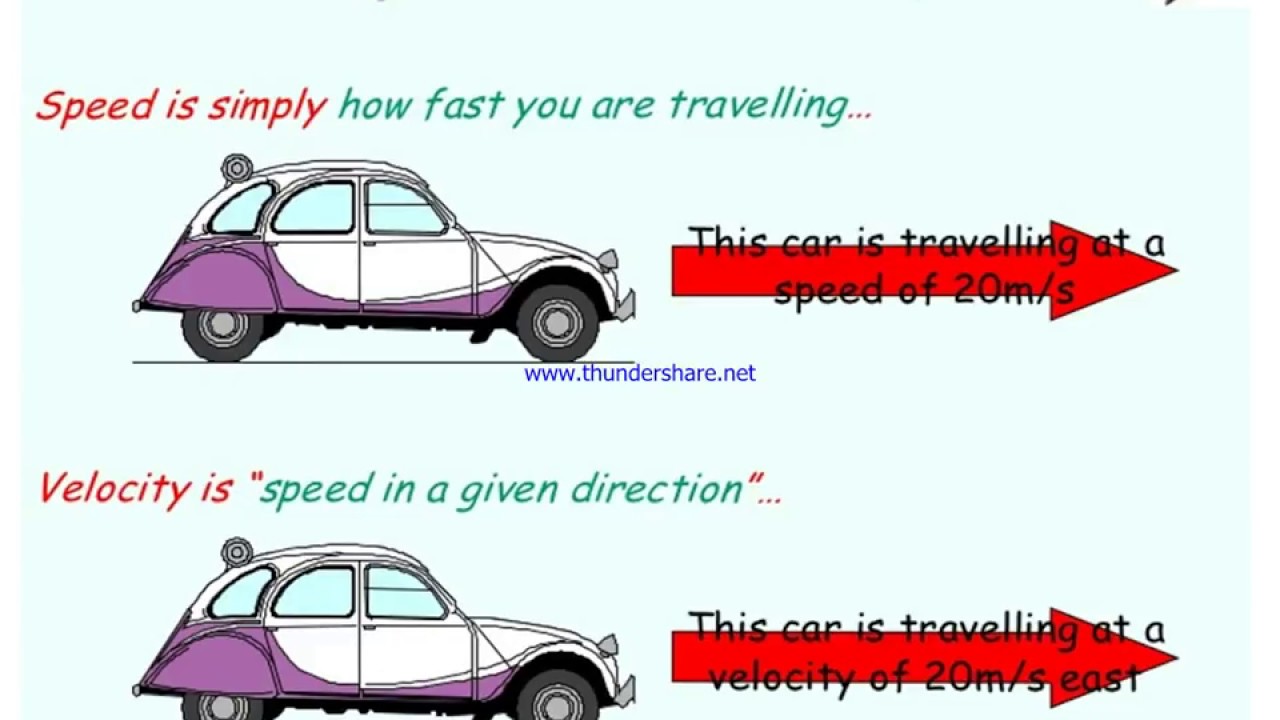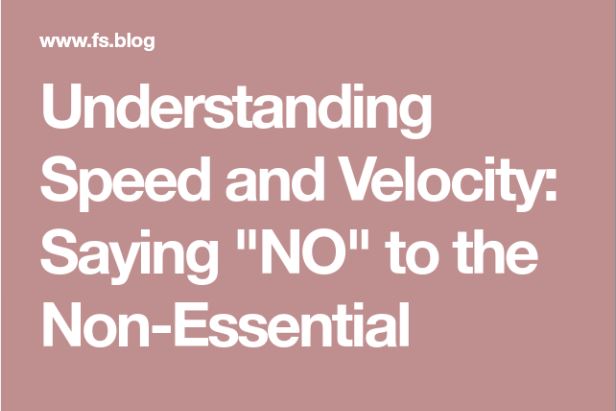Speed And Velocity
Not To Confuse Activity With Accomplishment

Speed And Velocity - Overview
Speed and velocity is a mental model drawn from physics. Speed is how fast you are moving, velocity is how fast you are moving in a specific direction.
Speed is measured as a scalar which is a quantity that is fully described by a magnitude of numerical value in relation to a metric e.g. miles per hour, number of emails/meetings/calls per day.
Velocity is measured as a vector that is a quantity that is fully described by BOTH a magnitude of numerical value in relation to a metric AND a direction. e.g miles per hour heading south towards New York / London etc. number of emails/meetings/calls per day to the achievement of a specific milestone to the completion of a project or other clearly defined objective.
Let's move beyond physics and apply this to everyday life and in the context of the purpose and objectives of this site: namely
- To show you how to cope in tough times, and to provide you with the tools to do this successfully.
- To show you how to think effectively and how to master the art of not thinking, because a quiet mind is an insightful mind and a resourceful mind.
- Understanding that the outcomes that you experience are determined by your responses to the events in your life.
- The strength and quality of your response is determined by the quality of your thinking.
So let us reframe speed and velocity as:
Speed = Rate of Activity or "Busyness" Per Day - for example, over the past 24 hours, how many emails/messages you have initiated or responded to, how many calls you have made, how many meetings you have attended, how much planning and research you have engaged in.
Velocity = Rate of Activity Per Day Measured As Achieved Milestone[s] Towards Your Specific Objective - how far has this activity and "busyness" progressed you towards your overall objective?
All too often we confuse activity with accomplishment, and this is especially prevalent in the corporate working environment.
The politics of perception in corporate working life are sufficiently distorted that your "busyness" is seen and celebrated as a badge of honour - hence "the long hours culture". In my past experiences in corporate life in the UK my colleagues and I coined a phrase: The 3 levels of wanting Only the first category had anything to do with veloclty, the rest was just varying degrees of "busyness" sufficient to throw up a "chaff screen" and deflect unwelcome senior management attention!
In "Understanding Speed and Velocity: Saying “NO” to the Non-Essential" Shane Parrish provides some excellent examples of how and why he learned to say no to the non-essential requests that were put to him by his boss when he was working in the field of cyber-security, and he makes the obervation that: "...saying yes to everything is a quick road to mediocrity.." Shane offers the following advice: "You need to distinguish between tasks that offer a lot of speed and those that offer velocity. Here are three ways you can increase your velocity:
Speed And Velocity - The Politics Of Perception

Speed And Velocity - Saying "No" To The Non-Essential

Speed And Velocity - Task Optimisation
Knowing The Point At Which An Essential Task Becomes Non-Essential

Most material that I have seen on this mental model focuses on saying "No" to non-essential requests and activities.
The locus of control here is external in that it relates to things that are external to you and your point of focus.
I agree with this, but in my experience there is an additional dimension to this, and this is to do with task optimisation.
With task optimisation the locus of control is internal # This is about knowing the point at which focused "busyness" does not increase velocity and starts to impede it. # This is about knowing when an essential task becomes inessential.
Let me illustrate this point with the example of the creation of this article and its posting on this webpage.
I am currently working to a schedule of creating and posting one webpage per day.
In order to achieve this successfully I need to accomplish a series of tasks in a specific sequence and within a defined time window.
So, this morning I knew that my subject for today was "speed and velocity". To achieve my objective for today there are 3 main tasks.
1] Reading and research of subject material for this article and considering my own real life experiences in this area.
2] Drafting and formatting the material.
3] Posting this material as a webpage.
I have found from considerable experience of this process that I need about two to three hours for steps 2 and 3, but unless I am careful step 1 can take far longer than it should. This morning I found myself getting drawn deeper and deeper into the physics of this subject, which as a non-academic I found interesting and challenging.
After a while I realised that I was wasting time and continued research was beyond the scope of this article. So, in practical terms, I had reached the optimum allocation of resource and effort that was required to complete step 1.
I was able to do this because I have extensive experience
of this process and I have an established set of criteria that enables
me to make this call.
Return from "Speed and Velocity" to: Mental Models
LATEST ARTICLES
The Inner Weight of Shame - Sustained By Attentional Fixation
 A Mind That Is Continuously Engaged In Self-Surveillance. Shame is one of the heaviest inner burdens a human being can carry. It does not announce itself loudly or demand attention through drama. Inst…
A Mind That Is Continuously Engaged In Self-Surveillance. Shame is one of the heaviest inner burdens a human being can carry. It does not announce itself loudly or demand attention through drama. Inst…Does Prayer Work? The Psychology of Prayer, Meditation and Outcomes
 Reality Is A Complex System Of Countless Interactions - Including Yours. So does prayer work? The problem is that the question itself is usually framed in a way that guarantees confusion. We tend to a…
Reality Is A Complex System Of Countless Interactions - Including Yours. So does prayer work? The problem is that the question itself is usually framed in a way that guarantees confusion. We tend to a…Living in Survival Mode Without Surrendering Mental Authority
Living in Survival Mode Without Surrendering Mental Authority
 Clear Thinking When You’re Just Trying to Stay Afloat. Many people today are overwhelmed because they are living in survival mode - not temporarily, but as a persistent condition of life. For many, th…
Clear Thinking When You’re Just Trying to Stay Afloat. Many people today are overwhelmed because they are living in survival mode - not temporarily, but as a persistent condition of life. For many, th…Manifestation Without Magic: A Practical Model
 Manifestation without magic is not a softer or more intellectual version of popular manifestation culture. It is a different model altogether. Popular manifestation teachings tend to frame reality as…
Manifestation without magic is not a softer or more intellectual version of popular manifestation culture. It is a different model altogether. Popular manifestation teachings tend to frame reality as…Staying Committed When You Can't See Progress - The Psychology of Grit
 Uncertainty Is Not The Absence Of Progress, Only The Absence Of Reassurance. One of the most destabilising experiences in modern life is not failure, but uncertainty and staying committed when you can…
Uncertainty Is Not The Absence Of Progress, Only The Absence Of Reassurance. One of the most destabilising experiences in modern life is not failure, but uncertainty and staying committed when you can…The Battle For Your Mind - How To Win Inner Freedom In A Digital Age Of Distraction
 From External Events to Inner Events. We often think of “events” as things that happen out there: the traffic jam, the rude comment, the delayed email reply. But what truly shapes our experience is wh…
From External Events to Inner Events. We often think of “events” as things that happen out there: the traffic jam, the rude comment, the delayed email reply. But what truly shapes our experience is wh…How to See Your Thoughts Without Becoming the Story
 A Practical Guide to Thought-Awareness. You can spend your life inside the stories of your mind without ever learning how to see your thoughts clearly and objectively. Most of the stuff we tell oursel…
A Practical Guide to Thought-Awareness. You can spend your life inside the stories of your mind without ever learning how to see your thoughts clearly and objectively. Most of the stuff we tell oursel…The Collison Decision Matrix - A Simple Framework for Better Choices
 The Collison Decision Matrix Is A Practical Everyday Thinking Tool. Most of us spend a surprising amount of time worrying about decisions. From small ones such as what to wear, what to eat, what to te…
The Collison Decision Matrix Is A Practical Everyday Thinking Tool. Most of us spend a surprising amount of time worrying about decisions. From small ones such as what to wear, what to eat, what to te…The Power Of Asking The Right Question
 The Power Of Asking The Right Question Lies In The Quest For Insight. To experience the power of asking the right question you must develop the practice of asking questions. The best way to improve th…
The Power Of Asking The Right Question Lies In The Quest For Insight. To experience the power of asking the right question you must develop the practice of asking questions. The best way to improve th…Site Pathways
 Here is a site pathway to help new readers of Zen-Tools navigate the material on this site. Each pathway is based around one of the many key themes covered on this site and contain a 150 word introduc…
Here is a site pathway to help new readers of Zen-Tools navigate the material on this site. Each pathway is based around one of the many key themes covered on this site and contain a 150 word introduc…How To Live With Contradiction - Beyond Thought Let Stillness Speak
 A major impact on so many peoples' lives is the situational contradiction of unfilled realistic expectations. So where does all this leave us? Well here we are, with mental equipment that is more lim…
A major impact on so many peoples' lives is the situational contradiction of unfilled realistic expectations. So where does all this leave us? Well here we are, with mental equipment that is more lim…